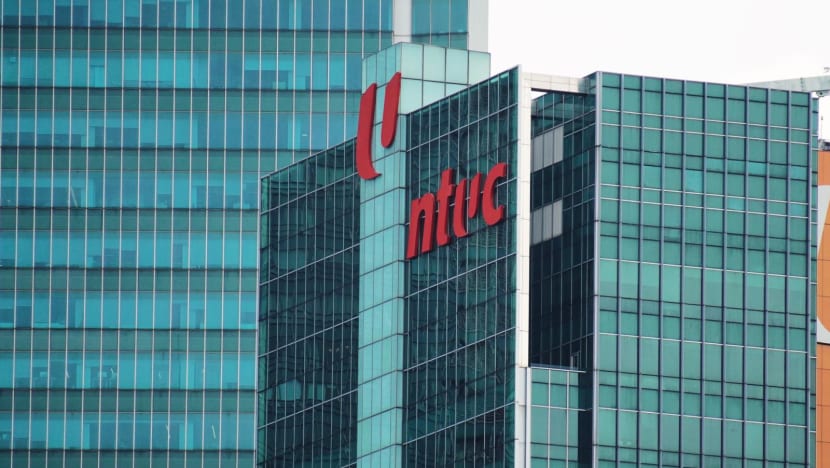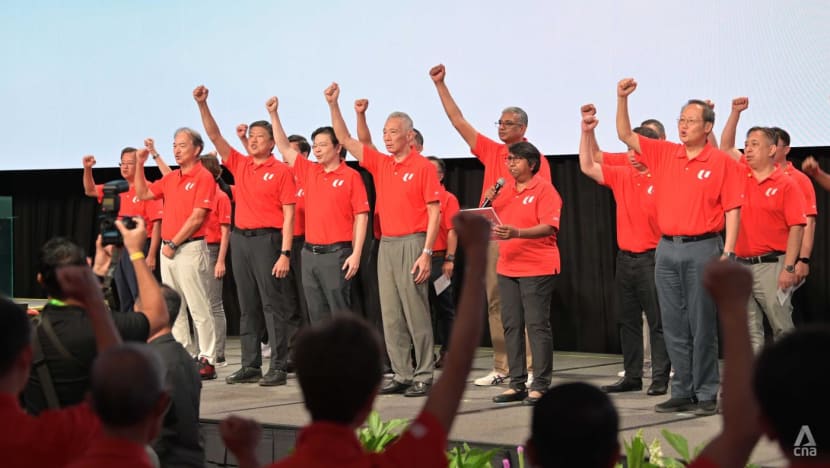NTUC set to be designated 'politically significant person' under foreign interference law given close, symbiotic PAP links
Given NTUC’s “close nexus and symbiotic relationship” with the ruling PAP, the Home Affairs Ministry says it is in the public interest for measures under the foreign interference law to be applied to the labour movement.

NTUC Centre building at 1 Marina Boulevard. (Photo: iStock/Ridham Supriyanto)

This audio is generated by an AI tool.
SINGAPORE: The National Trades Union Congress (NTUC) is set to be designated as a “politically significant person” (PSP) under Singapore’s foreign interference law due to its “close nexus and symbiotic relationship” with the People’s Action Party (PAP), the Ministry of Home Affairs (MHA) said on Thursday (Jul 11).
As a designated PSP, the labour movement will be required to make annual disclosures on political donations of S$10,000 (US$7,400) or more, as well as its foreign affiliations.
“These transparency requirements will mitigate NTUC’s risk of being a target of foreign interference,” MHA said in a media release, adding that NTUC was served a notice on Thursday of the intention to designate it a PSP.
NTUC has 14 days from the date of the notice to submit representations to the Registrar of Foreign and Political Disclosures, who is appointed by the Home Affairs Minister.
If its PSP status is confirmed, NTUC would be the third organisation to be designated as such, following human rights groups Maruah and Think Centre.
While NTUC is unlikely to make any representations, it said it will have to review MHA's requirements for the designation process.
NTUC said in response to CNA's queries that it does not accept donations from political entities.
"The National Trades Union Congress is aligned with national safeguards to prevent foreign interference, and we will continue to ensure that our operations remain free from foreign influence," a spokesperson said.
NTUC secretary-general Ng Chee Meng said separately that the labour movement is committed to championing workers' interests with accountability and transparency.
"(We) would like to assure our members, partners and stakeholders that NTUC's core work to better workers' lives and livelihoods will continue unabated," he added.
Singapore's foreign interference law, known as the Foreign Interference (Countermeasures) Act or FICA, is aimed at strengthening the government’s ability to prevent, detect and disrupt foreign interference in domestic politics. The Bill was passed in parliament in October 2021 after a lengthy debate.
Among those defined as PSPs are political parties, political office holders, Members of Parliament, election candidates and their agents.
“The Registrar has assessed that given NTUC’s close nexus and symbiotic relationship with the People’s Action Party, it is in the public interest for countermeasures under FICA to be applied to NTUC,” the Home Affairs Ministry said on Thursday.
In a media statement, the Ministry of Manpower (MOM) noted that the intended designation of the NTUC as a PSP “does not result in any prohibition on NTUC’s ongoing activities”.
“MOM will continue to work with NTUC as a key tripartite partner. NTUC’s activities have been in compliance with the Trade Unions Act,” a spokesperson said.
In response to media queries, MHA on Thursday evening described NTUC’s designation as “a pre-emptive measure”, adding: “It is not because NTUC has been compromised by a foreign actor, or has committed any wrongdoing nor anything of concern.”
It also said that the Registrar only intends to designate NTUC at the federation level.
“The other NTUC-linked entities have much less or no nexus to Singapore politics, and there is no public interest to designate them,” it said.
NTUC’s designation will therefore not cover its affiliated unions, affiliated associations or social enterprises, which are separate legal entities.
“NTUC’s designation will also not include NTUC’s personnel such as its Central Committee members and employees,” MHA added, noting, however, that some of NTUC’s Central Committee members and appointment holders may already be PSPs by virtue of their roles outside NTUC.

NTUC’S LINKS WITH PAP, FOREIGN ENTITIES
NTUC, Singapore’s labour movement, unites dozens of trade unions and several social enterprises in the country.
NTUC and its affiliated unions have also been members of the international labour movement since the 1960s. It has foreign affiliations with organisations like the International Trade Union Confederation (ITUC-Asia Pacific) and the ASEAN Trade Union Council.
In Singapore, the relationship between the NTUC and the ruling PAP dates back to 1961 when it was founded by pro-PAP unionists.
Today, the PAP works closely with NTUC to implement labour-related policies, as part of the country’s brand of tripartism – collaboration between unions, employers and the government.
At a May Day Rally speech in 2023, then-Deputy Prime Minister Lawrence Wong spoke about the close relationship between the PAP and NTUC, describing them as “sibling organisations” that participate in each other’s rallies.
“The basis of tripartism is the symbiotic partnership between NTUC and the PAP,” Mr Wong said at the time.
“We share the same objectives – to improve the lives of workers and Singaporeans, promote economic growth for all, and ensure social cohesion and stability.
“That’s why through good times and bad, workers and unions have supported the PAP.”
Mr Ng, who has been labour chief since 2018, was a former Cabinet minister. After losing his parliamentary seat in the 2020 General Election, he was co-opted in 2020 and 2022 into the PAP’s central executive committee (CEC), the party’s top decision-making body.
It was a rare move for the PAP to choose non-MPs to join the CEC.
PRE-EMPTIVE MOVE
Two political analysts told CNA that the intended designation of NTUC makes sense since it meets the requirements of FICA.
"This move should not be surprising because of NTUC’s evident political influence and reach, which makes it a suitable candidate for designation as a PSP," said Associate Professor in Practice Terence Ho, who is from the National University of Singapore's Lee Kuan Yew School of Public Policy.
He said the move could be seen as a pre-emptive measure against foreign interference, although he noted there has been no suggestion that NTUC has had any such interference.
Associate Professor Eugene Tan from the Singapore Management University (SMU) agreed that it was a "necessary and timely" move.
"This intended designation is a proper and needed application of the law to prevent, detect, and disrupt foreign interference in our domestic politics," he said.
"The law cannot discriminate between entities that are closely connected with the ruling party and those that are not," he said. "The former could be argued to be more likely to be a target of foreign actors seeking to interfere in our domestic politics."
Assoc Prof Tan added that it would be highly unusual if NTUC is not designated as a PSP. "It was a question of when rather than whether NTUC would be so designated."
The union's activities are largely directed towards a political end and it is in the public interest for appropriate measures to be taken, he said.
The transparency declarations that a designated PSP has to make can cause NTUC to be prudent and alert to attempts by foreign actors to manipulate it and interfere in Singapore's politics, he added.
The designation would not change the political landscape significantly, Assoc Prof Tan said.
"It will not affect how NTUC engages the PAP government and vice versa."
OTHER ENTITIES DESIGNATED AS PSPs
Two human rights groups – Maruah and Think Centre – were designated as PSPs in December 2023 and subject to stricter measures on political donations.
This came about after the repeal of the Political Donations Act (PDA), under which the two civil society groups were gazetted.
The Political Donations Act had imposed certain restrictions on donations and those measures were ported over to the new foreign interference law.
Maruah aims to promote human rights at the national, regional and international levels. It is also the Singapore focal point for the Working Group for an ASEAN Human Rights Mechanism, an NGO recognised in the ASEAN Charter.
Think Centre is a member of Forum Asia, an international NGO working on human rights.
MHA said that the reasons for designating NTUC as a PSP were as such “very different” from the reasons behind the designations of Think Centre and Maruah.
“Think Centre and Maruah's designations were accompanied by stepped-up countermeasures under FICA which were issued to largely mirror requirements imposed on them under the PDA,” said MHA.
“In contrast, the Registrar intends to designate NTUC because NTUC has a close nexus and symbiotic relationship with the PAP, and in the Registrar’s opinion, it is in the public interest for countermeasures under FICA to be applied to NTUC.
“The Registrar does not assess that it is necessary to issue stepped-up countermeasures to NTUC at this point.”
Under FICA, both Maruah and Think Centre are subject to requirements such as maintaining a separate bank account for political donations and disclosing foreign affiliations.
In February, Singaporean businessman Philip Chan Man Ping became the first person to be designated as a PSP under the foreign interference law.
MHA said at the time that Mr Chan, who immigrated from Hong Kong in 1990, has shown “susceptibility to be influenced by foreign actors, and willingness to advance their interests”. The foreign actors involved were not identified.
Law and Home Affairs Minister K Shanmugam previously said that when the Singapore authorities decide to designate someone a PSP under the foreign interference law, they must conclude that it is in the public interest to do so.
In response to parliamentary questions, Mr Shanmugam explained on Feb 29 that to be designated as a PSP, an individual must be a member of a foreign legislature or foreign political organisation, or their activities must be directed towards a political end in Singapore.
“But in addition to this, there is also the public interest criteria that must be satisfied,” he added.






















